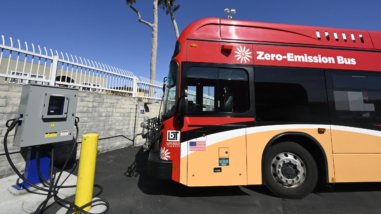This is the first in a five-part series by Hewlett Foundation Environment Program Officer Erin Rogers about what charitable philanthropists and nonprofits are learning about ways to convert widespread public support for clean energy and other climate solutions into policy action that can ensure a safer climate for all. Jump to Part Two of this series.
As a program officer in the Hewlett Foundation’s Environment Program, there is one question that runs through the back of my mind almost every waking hour: what will it take to reduce global warming pollution fast enough to avoid impending human suffering, species extinction, and ecosystem collapse? With every uptick in global temperature, the risk and severity of climate impacts grows exponentially. Yet the rate of policy adoption, market shifts, and behavior change leading to our transcendence out of fossil-fueled economies is happening at a decidedly linear pace.
To get on track to a safer climate, the Hewlett Foundation and many other philanthropies support efforts geared toward systems change, aiming for big leaps toward solutions in addition to lots of smaller steps. In the United States, one of the most important and potentially transformational systems that, if shifted, could unlock exponential rates of change, is the complex system of social forces that academics loosely call “political will.”
To be clear, this is not the same as talking about elections. The Hewlett Foundation is a nonpartisan charitable foundation, and that means we don’t get involved in elections nor do we earmark any funds for lobbying. But there is wide array of nonpartisan activity that we can support to respond to the public’s widespread interest in climate action. This includes support to nonprofit organizations educating the public and decision makers, providing nonpartisan research, and other activities that provide public benefit.
Let’s first take a step back to understand exactly what needs to change and how fast. In the United States, doing our fair share to stay below a 2-degree rise in global temperature (and thus avoid the suffering that comes with that warming) means nearly fully decarbonizing our economy by 2050.
To stay on track toward that goal and meet our obligations under the Paris climate accord, we’ll need to accomplish a lot by 2025—a mere seven years from now. About a third of our electricity will need to come from renewable energy sources like solar and wind by then. These clean sources provide less than 10% of our electricity now. About half of today’s coal-fired power will have to come off-line or fully capture their emissions. At least a quarter of our car and truck sales will need to be fully electric, up from 1% electric vehicle sales now. And about 80% of all new residential water and space heaters sold will have to be electric, not gas. (For reference, this means that people will have to buy electric vehicles and electric heaters at the same pace they bought cell phones, the internet, or color TVs during their take-off periods—a heavy lift.) The fuel efficiency of regular gasoline-fueled cars and trucks can’t decrease, despite current attempts to undermine our national fuel economy standards. We’d have to at least double energy efficiency in buildings, appliances, and industry.
Political will can make or break our ability to hit those marks.
But what is political will, exactly? At its core, it is simply the willingness and ability of decision-makers to implement and sustain a policy. In order to build political will, supporters of a policy can shape the circumstances under which decision-makers act, in order to make positive outcomes more likely.
Converting public support into policy action often means overcoming powerful incumbents, wealthy opponents, and the perpetual force of the status quo. In the case of climate change, opponents have spent billions of dollars to stymie climate solutions and sow confusion and deep polarization amongst decision-makers and the public. Because of this, the public is deeply divided on acknowledging the overwhelming scientific evidence of climate change. Yet large majorities of the public favor a wide range of climate solutions, including clean energy, carbon pollution limits, and cleaner, more efficient vehicles. However, decision-makers, broadly speaking, are not acting on this wide-spread public support for solutions.
Why?
They lack the political will to overcome narrow but well-funded opposition and break from the status quo to provide the solutions the public demands.
This series will examine some of the ways that organizations in the United States are grappling with how to more rapidly convert public support into sustained policy action. Some of these groups are Hewlett Foundation grantees, and some are not–but all give me hope.
In particular, I’ll explore how charitable funding can make a difference in building political will in four ways: 1) breaking the “us vs them” binary by supporting a healthy ecosystem of climate action and clean energy supporters, 2) sustaining connections between grassroots constituents, policy advocates, and decision-makers, 3) connecting heart and mind, and 4) embedding equity.
The examples in this series are by no means comprehensive, nor are they limited to our own grantmaking here at Hewlett. There is so much more great work being done, and much more to do and more to learn about how to do this work better. The magnitude of the challenge is not only enormous, it’s also urgent. More ideas, more experiments, and more funding are needed.




